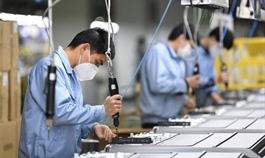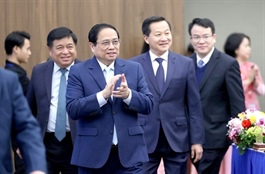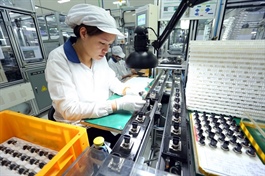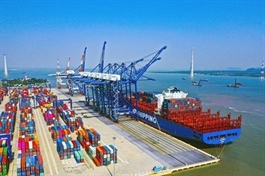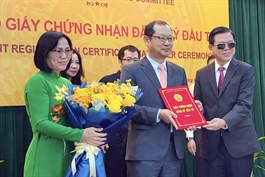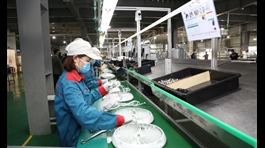Vietnam logs positive economic growth amid global uncertainties
Vietnam logs positive economic growth amid global uncertainties
Vietnam has experienced encouraging growth in both its economy and national credit rating over the past year despite a global economic downturn.
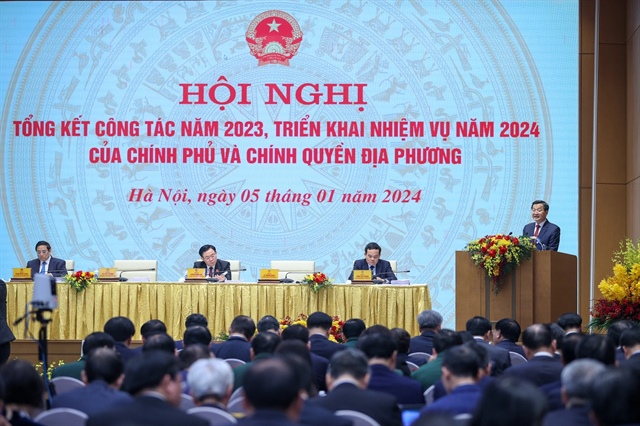
Deputy Prime Minister Le Minh Khai presents the 2023 economic results report in Hanoi on January 5, 2024. Photo: VGP |
With an economic expansion of 5.05 percent in 2023, the Southeast Asian country’s GDP rose to US$430 billion, putting it amongst the fastest-growing economies in the world last year.
On January 5, Deputy Prime Minister Le Minh Khai presented a report on the country’s economic and social activities in 2023, as well as the path forward in 2024, at a central government-hosted conference attended by local authorities.
Vietnam’s credit rating upgraded to BB+
Assessing the country’s economic achievements in 2023, Khai highlighted that Vietnam's GDP growth rate has consistently grown since the end of the COVID-19 pandemic.
Last year's growth rate was 5.05 percent, thus placing Vietnam amongst the region’s fastest-growing economies.
Currently, Vietnam’s GDP sits at $430 billion.
Alongside its ascending GDP, the nation experienced an enhancement in its credit score, escalating from BB to BB+ in 2023 according to Fitch Ratings.
This achievement bestowed upon it the designation of 'stable,' a recognition given to only two out of 62 countries in the Asia-Pacific region.
Furthermore, Vietnam's national brand is now valued at $431 billion, putting it at number 32 out of the world’s top 100 national brands.
In 2023, the disbursement of public investment capital reached a historic high, totaling nearly VND676 trillion ($27.6 billion), surpassing the previous year's level of VND146 trillion ($5.9 billion).
In 2022, the cumulative registration of foreign investment amounted to $22.1 billion, accompanied by a repatriated profit of $2 billion.
Last year, the country underwent significant changes in its economic structure, notably marked by the digital economy contributing 16.5 percent to the GDP.
This achievement solidified Vietnam's digital economy sector as the fastest-growing in all of Southeast Asia for two consecutive years.
Infrastructural development, particularly in transportation, has also seen extraordinary transformations. In 2023, Vietnam initiated 25 projects which saw the combined addition of 475 kilometers to the national expressway network, bringing the total length of highways in Vietnam to 1,900 kilometers.
Looking ahead to 2024, Deputy Prime Minister Khai shared that the government's management slogan – "disciplined responsibility, timely initiative, accelerated creativity, and sustainable efficiency" – has helped guide the country’s economic policy.
The present objective of the government is to increase the economic growth rate, currently targeted between six and 6.5 percent, while simultaneously sustaining a stable macroeconomic status and controlling inflation rates within the range of 4-4.5 percent.
Additional priorities include maintaining stable foreign exchange rates and reducing frequent expenditures by five percent.
A strategic approach to structural transformation
The government is committed to restructuring the economy, leveraging existing and new driving forces, and setting the goal of increasing export turnover by at least six percent compared to 2023.
Strategic breakthroughs in 2024 include the timely and qualitative completion of key legal projects, such as the amended Land Law and the adjusted Law on Credit Institutions.
The government also plans to continue the rearrangement of administrative authorities at the district and commune levels from 2023 to 2030.
In the transportation sector, the government aims to add 3,000 kilometers of expressway by 2025. The completion and operation of the Ben Thanh - Suoi Tien metropolitan railway network is scheduled for 2024.
Public investment schemes are also expected to prioritize the development of digital infrastructure, agricultural and rural infrastructure, and adaptation to climate change.
The government will assign agencies to research and suggest special mechanisms for the development of energy and renewable energy.
According to Deputy Prime Minister Khai, the timely and effective implementation of the Power Development Plan for the 2021-30 period, with a vision to 2050, is crucial in preventing shortages of power and petrol gas.
To spur industrial fields, especially processing industries and manufacturing semiconductor chips, the government aims to strongly promote culture while maintaining a harmonious connection with economic development.
Sustainable solutions for poverty reduction, including the construction of at least one million social apartments in the next few years, with at least 130,000 completed in 2024, are also part of the government's multifaceted approach.
In a bid to boost this year's economy, the government aims to streamline administrative procedures, enhance the investment environment, promote digital transformation, and help individuals and enterprises reduce costs and fees.
Increased efforts in economic diplomacy will reshape the economic structure and attract high-quality direct investment funds, especially in new and breakthrough fields.



